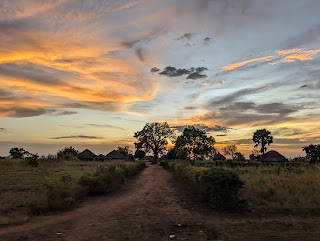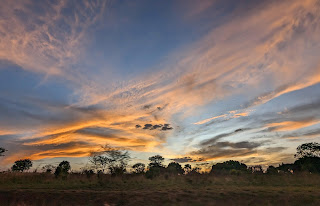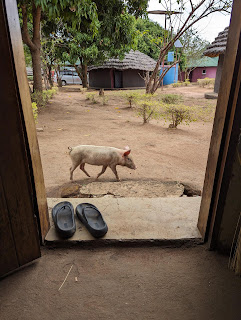Good Morning, friends!
It's early, Easter Sunday morning here in Atiak. Another week of record temperatures and so much sweating! We had a few days of respite in the low 90's, but it didn't last. All of our electronics are fritzing out from the heat, especially my computer, which I have been using for lectures. Luckily, the next 2 weeks are primarily hands on, so I can give my computer a rest.
 |
A few nights ago, we were blessed with rain and the
temperatures dropped to a lovely 80 degrees. Picho
showed up for dinner in a sweatshirt 😂 and many of
the locals complained of the cold! |
Religious holidays are a big deal here, so there was no class on Good Friday. Four of us spent the day in Gulu, going to the market, having lunch, then spending the afternoon at the hotel pool to cool off. The market was not crowded in the morning, because most of the locals were celebrating by attending church and parading through the streets with large wooden crosses. When we drove by early evening, on our way out of town, the place was packed with people.
One of the ladies with us is a midwife student from the states, so she was on a gift purchasing mission. She and her husband also run a small farm and work with their community on urban farming, so we stopped at one of the farm stalls so she could purchase seeds to take home.
The market is held in a huge, multi-level building in the town center. The bottom floor and surrounding parking lot are filled with mostly produce and household products, with some used clothing stalls on the outside outskirts. The upper levels of the building are filled with clothing and fabric stalls, with some local crafts as well. It's easy to get lost (and overwhelmed) but as a lover of markets, I really enjoy it. At some point, we reached our limit and went to the 2nd Ethiopian restaurant in town for lunch, then on to the pool. The weather was a bit cooler in Gulu, with a breeze, and the drive home was beautiful.



Last week was filled with challenges as the power was out for 2 complete days, then continued to come back sporadically for most of the week. In some areas of the camp, even the solar hook-ups were not working. Charging electronics with solar power here is slow and often the source of overheating, so lectures were given by looking at the accompanying notes together and a lot of sketches on a small dry erase board I bought for the trip. We were only able to scan patients until the batteries were empty, then we carried the machines to any available source of power to recharge. As frustrating as it was to manage this while teaching, imagine having to uphold patient care in this environment. Power has only come to this part of Uganda in the last 2 years or so, and overall, the solar set-ups are quite good and dependable, but still a challenge.
On my last trip with ITW, to Kenya, ITW gave t-shirts to the trainees. Gifts, in general, are a very big deal here, so I worked with Allan back in Kampala and ordered some shirts with our new logo to give to the trainees. I also had him send more towels and 5 more solar lamps. Up until now, the midwives use cotton batting to clean off the pregnant women, after using the doppler to check for fetal heart rate. Since giving them towels, they are thrilled at the idea of no longer using cotton. The package was sent on one of the buses, arriving in Gulu and stored at the bus station until Picho could pick it up.
 |
| Frankie joined us for lectures one morning. |
 |
| The Team of Trainees in their new T-shirts. |
 |
In total, I have given 9 solar lamps to the Birth Center.
2 of them will remain with the cooking and cleaning staff
and the other 7 will be given to midwives when they have
to go out to the villages at night for a call or when they
need extra light in the birthing rooms. (Thanks again, LeeAnn
and Jason! I could not have done this without you! 😍) |
The shirts were a huge hit! And everyone was very excited to get our photos taken. My plan is that I will have a photo printed and laminated (a very big deal here) and everyone will get one as a gift at the end of the course, along with a certificate of attendance (another big deal).
I have had an interesting shift in my thoughts about the solar lamps. Originally, the group decided to distribute lamps to clinics, keeping close track of where they go, assigning them a registered number, etc... fully expecting a number of them to go missing. Part of the diligence was due to the cost of buying them (expensive even with the NGO discount) and getting them here. After talking with the midwives here and seeing how excited they were at having a reliable light source, I have made the decision to just get them in the hands of as many people as possible. There are solar lamps for sale here, but they are not reliable, one of the midwives telling me she has had many that don't last a week! Picho has already plans on giving his light to Odong when we leave (he is the Makere midwife in my class) and I know he gave away the last light I gave him to his mom. It's too complicated to come up with a "fair" plan of distribution, when there are so many people whose lives can be improved with one reliable solar lamp. Imagine all of the 20 midwives at the Birth Center and all of the 60 traditional midwives living in the surrounding villages having a $30 solar lamp that's waterproof, can be charged with the sun or a power source, and can light up an entire hut where a woman is giving birth. I can imagine it and that's my plan. When I return to Kampala in 2 weeks, I will have 1 day to sort, wash, and repack, then Allan and I will go to Ssese Island to visit 3 clinics and assess a 4th. The islands often lose power, so I will bring another batch of solar lamps and make sure that the sonographers we have been working with all have lamps. I'll give until they're gone and start saving and fundraising for more!
As I sit here in the doorway of my hut, typing away, 2 small geckos dropped from the ceiling, landing next to my chair. All three of us stunned for a moment, they quickly recovered and ran off, either 2 males fighting, or a couple so overwhelmed by their own passion that they forgot to cling to the roof! 😂 I have also had a number of walk-by visitors, as my hut lies on the "farm animal freeway" connecting the nearby field to the closest source of water and snacks, our kitchen. Ah, country life in northern Uganda!

Monday evening, I will give a written exam to the trainees, marking the end of the lecture portion of their training. I do not trust the power, so it will be a written exam, although in the past we have used Power Point to show images for identification. As someone who suffered from text anxiety, as so many of us have, I have explained that there is no time limit to this exam (for many of them, English is a 2nd or 3rd language, which they translate in their heads), given pointers on how to approach each question (start with what you know), and have told them they can ask if they are unclear as to what I am asking. Most importantly, I have explained that no one "fails" this course. The exam allows me to see where I can make changes in my lectures and where they need to spend more time. I have also made myself available all weekend and a small study group joined me in my hut last night for questions. One of the biggest challenges for them seems to be "thinking outside of the box". They struggle to expand their thought process beyond the strict way they have been taught up until now.
Using past exams given by the CHI education team, I decided to rewrite the exam, asking questions with clinical relevance and questions that encourage an overall understanding of Ultrasound physics. The "traditional" style of education, focusing on rote memorization, is the standard here, but I have seen it fail in a clinical setting (here and in the states) and I really want to set these people up for success and give them applicable skills and knowledge. Otherwise, what is the point of all of this? This is also why I set up the curriculum to complete the lectures halfway through the training. You cannot learn ultrasound if you are not scanning, so the remaining 2 weeks will focus on putting the lecture information to work in a clinical setting and learning the actual technique of scanning. I will let you know how it works!
By the way, a chicken just attempted to enter my hut and yesterday a pregnant goat had to be chased off twice as she scoped out my place. Possibly looking for the goat birth center? 😏
The rest of the compound is waking up and I know the Wi-Fi will be limited as the heat rises, so I will sign off. Next weekend, Picho and I will escape to Murchison Falls for the weekend, so I will probably wait until Monday morning to write again. Wishing you all a wonderful week and thanks for joining my adventures!
Much love, Jo/MB














You are doing SUCH a good job, Jo, and working so hard. You go girl!
ReplyDelete